Well, I have come to a
time to blog again! have been m.i.a for some time and i shall update what i have been up to.
haha firstly, i miss my office computer! its nicer to use and faster than my current laptop.
boohoo!
okay. this is a random picture i drew in weiling's sketchbook. during the days i was so bored. =D

Saturday...
was EXERCISE day. went to walk the bridge again with parents. from my house to mount faber to Hort Park to Kent Ridge there just to eat prawn mee! oh man so piggish right! we crossed a total of 3 mountains!
after tt i rushed to give tuition then met my sister for swimming at Mt faber Safra and i swam 20laps! wahhH!! tiring day!
Sunday...
i went out with liru aka ruruu! it was supposed to be an ostro gang outing-ky but yc suddenly sms-ed to say she wasnt feeling well! so in the end i had a date with ruru. =D met at dhoby and walked about aimlessly. went to SMU to buy MR TEA which is highly recommended by me cos its nice, has lots of variety and it is affordable too! but beware cos its filled with CALORIES! cannot drink everyday if not will get fat de.
From SMU we then walked to Raffles city then to Central at Clarke Quay for Ramen then to Raffles shopping centre again and to Nat lib.
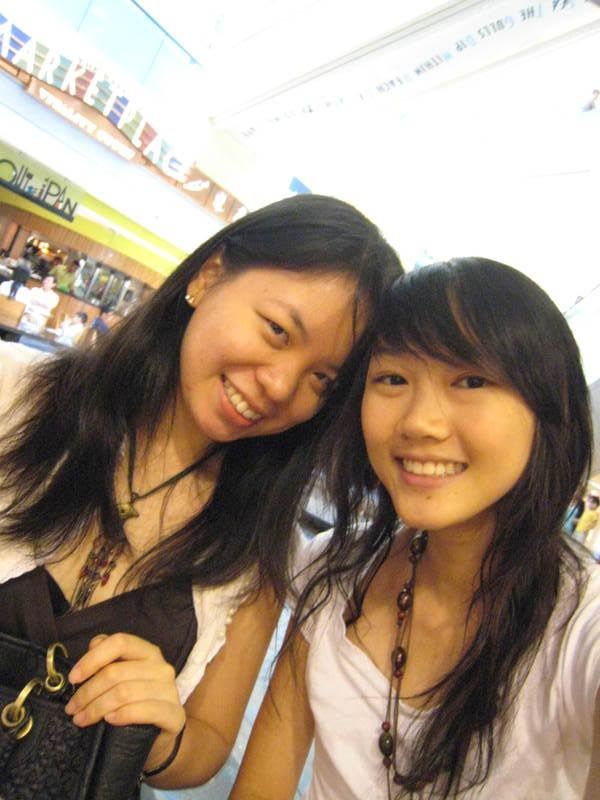
ruru and i. great to catch up after not seeing each other for such a long time! ><
after that i walked from Nat lib to Golden mile to meet my family for dinner then we walked back to Bugis then Suntec then citylink. Tiring man! Legs gonna break!
Monday...
was badminton day with my work friends. ( sounds nicer than colleagues right...? :) ) it was an outing with weiling, lerler the log, daryl g. and yeongtay. loggy had booked a badminton court at Clementi Stadium so we went there to play. there were 5 ppl but only one court so we had to take turns. In the end i didnt really play a lot cause i kept allowing the others to play. it was fun nevertheless! realized my badminton skills sucks! time to brush up! i discovered a nice eating place called Sumo House at Clementi. They sell affordable Jap food! a new place to add to my food hangouts!
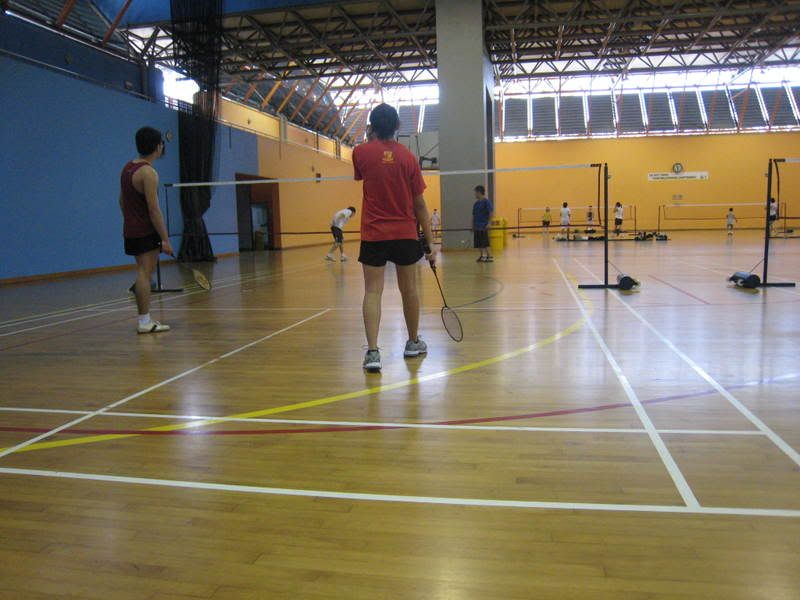
tuesday...
was the day i was supposed to go for a 2 days 1 night camp attachment. its a requirement before i get to work as a trainer with Innotrek.
it was a camp conducted for Coral Secondary School.
day1
went to pasir ris with weiling as that is where the school is. i was attached to a trainer called Umar. First was attendance taking then there was this objective setting and thinking of group name session. we handed out mahjong paper to them and got them to write why they wanna join the camp etc. they sat in a circle but no one moved! they were all just staring at the paper. i didnt know what to do loh! tried to get them to start discussing or smth but no one budged they just stared at me. to break the ice i tried to get them to introduce themselves but it also failed. in the end Umar came and somehow managed to get them moving. toughtough.
the bus was late and i kinda stoned there for awhile cos i didnt know how to entertain the kids.
felt so noob. what a bad start!
FINALLY the bus came and we got on the bus and headed to 100dairy farm road. that is where the MOE adventure camp is.
we allowed them to settle into their dorms and aftertt it was lunch. the trainers are really friendly, nice and helpful. they have loud booming voices that command authority. i wonder when i will be able to achieve that too!
lunch was not bad. had curry chicken and veggie and rice.
after lunch it was the first activity of the camp. a trek up bukit timah hill!
quite tiring and quite a long walk. we took at total of around 3 hours for the hike up and down the summit. the summit was only 163.69 metres though.
saw this quarry which is really nice!! =DD too bad didnt bring camera.
got lots of mozzie bites! itchy itchY!
there was debrief after we came back and once again when Umar prompted the kids to talk and discuss they kept quiet.think i'll have a hard time getting my group to talk next time!
then we had dinner.
after dinner we had more activities and also a night hike which i leaded. ^^ i walked in front it was rather dark but fortunately the moon was big round and shining.
we were behind schedule so had to rush 200kids to bathe within one hour. weiling and i was super tired and all and while rushing them to bathe we started to wonder why we even signed up to be a camp facilitator in the first place! the job was tough tiring low pay and all.
lights out was at 12am and after tt we trainers had a debrief.
after tt we had to shower and all and only got to sleep at 2plus am.
day2
woke up at 515am. had breakfast and area cleaning. got to know the kids better. they are actually rather friendly and nice ppl :)) we did high elements tt day. had abseiling, challenge rope course and rock climbing. i was the belayer. tiring but fun! there was once i nearly flew up when one of the kids fell during rock climbing...=X i tried one of the high elements as well. its not as easy as it seemed. was trembling when i reached the top and had to walk across a shaky log.
then it was debriefing and lunch and after tt we did some activities at the general stations. the sun was scorching! had activites like the wall where kids have to climb over a wall.
then more activites which i dont really rmb.
i was thrilled cos the day was ending!
nearing the end, got them to fill in an evaluation form. it was really great, fulfilling and satisfying to read the comments the kids wrote! hahah totally made my day =D they wrote things like how im kind, caring, friendly etc. HEEEE. i rmb one comment went smth like tt.."She may be inexperienced but her curiosity to learn makes up for it all. :) "
was badminton day with my work friends. ( sounds nicer than colleagues right...? :) ) it was an outing with weiling, lerler the log, daryl g. and yeongtay. loggy had booked a badminton court at Clementi Stadium so we went there to play. there were 5 ppl but only one court so we had to take turns. In the end i didnt really play a lot cause i kept allowing the others to play. it was fun nevertheless! realized my badminton skills sucks! time to brush up! i discovered a nice eating place called Sumo House at Clementi. They sell affordable Jap food! a new place to add to my food hangouts!

tuesday...
was the day i was supposed to go for a 2 days 1 night camp attachment. its a requirement before i get to work as a trainer with Innotrek.
it was a camp conducted for Coral Secondary School.
day1
went to pasir ris with weiling as that is where the school is. i was attached to a trainer called Umar. First was attendance taking then there was this objective setting and thinking of group name session. we handed out mahjong paper to them and got them to write why they wanna join the camp etc. they sat in a circle but no one moved! they were all just staring at the paper. i didnt know what to do loh! tried to get them to start discussing or smth but no one budged they just stared at me. to break the ice i tried to get them to introduce themselves but it also failed. in the end Umar came and somehow managed to get them moving. toughtough.
the bus was late and i kinda stoned there for awhile cos i didnt know how to entertain the kids.
felt so noob. what a bad start!
FINALLY the bus came and we got on the bus and headed to 100dairy farm road. that is where the MOE adventure camp is.
we allowed them to settle into their dorms and aftertt it was lunch. the trainers are really friendly, nice and helpful. they have loud booming voices that command authority. i wonder when i will be able to achieve that too!
lunch was not bad. had curry chicken and veggie and rice.
after lunch it was the first activity of the camp. a trek up bukit timah hill!
quite tiring and quite a long walk. we took at total of around 3 hours for the hike up and down the summit. the summit was only 163.69 metres though.
saw this quarry which is really nice!! =DD too bad didnt bring camera.
got lots of mozzie bites! itchy itchY!
there was debrief after we came back and once again when Umar prompted the kids to talk and discuss they kept quiet.think i'll have a hard time getting my group to talk next time!
then we had dinner.
after dinner we had more activities and also a night hike which i leaded. ^^ i walked in front it was rather dark but fortunately the moon was big round and shining.
we were behind schedule so had to rush 200kids to bathe within one hour. weiling and i was super tired and all and while rushing them to bathe we started to wonder why we even signed up to be a camp facilitator in the first place! the job was tough tiring low pay and all.
lights out was at 12am and after tt we trainers had a debrief.
after tt we had to shower and all and only got to sleep at 2plus am.
day2
woke up at 515am. had breakfast and area cleaning. got to know the kids better. they are actually rather friendly and nice ppl :)) we did high elements tt day. had abseiling, challenge rope course and rock climbing. i was the belayer. tiring but fun! there was once i nearly flew up when one of the kids fell during rock climbing...=X i tried one of the high elements as well. its not as easy as it seemed. was trembling when i reached the top and had to walk across a shaky log.
then it was debriefing and lunch and after tt we did some activities at the general stations. the sun was scorching! had activites like the wall where kids have to climb over a wall.
then more activites which i dont really rmb.
i was thrilled cos the day was ending!
nearing the end, got them to fill in an evaluation form. it was really great, fulfilling and satisfying to read the comments the kids wrote! hahah totally made my day =D they wrote things like how im kind, caring, friendly etc. HEEEE. i rmb one comment went smth like tt.."She may be inexperienced but her curiosity to learn makes up for it all. :) "
soon they had to go and it was quite sad seeing them leave in their buses. but i couldnt help smiling to myself as im happy the camp is finally over and i survived it!!!
Umar and the kids had asked me why i wanna take up this job and i answered it was for fun. the kids even asked me not to continue as they say its tough and lowpay but i guess its the experience that counts and the sense of satisfaction you gain at the end of everything. i got to make many new friends too as well as develop myself to be less introverted!
guess ill be doing more camps in future! ^^
thursday
went to learn driving today. it was quite bad because my engine stalled like 3 times at a traffic light turn and there was a big truck behind me. =X got super kan cheong loh then got scolded by instructor =( boohooo!!!
i wanna go overseas with friends! so many of my friends are doing that! but i dunno whther my parents will allow or not =(
it marks the end of my 4months job stint. learnt a lot during this job as well as made many new friends =D ( e.g daryl g., hongkun, thongler...)
to all my colleagues
thank you for your guidance as well as wonderful company. All the best!
FRIDAY
i went for the interview at NTU for the nanyang scholarship thingy. it was ok i guess, just a really short and casual chat. there were 3 interviewers. ntu is really very far and if i dont get this scholarship most likely ill end up in SMU =X
later tt afternn, went for FTT and glad to say, i PASSED! WHAAHAH. rather scary and i checked through all 50qns again.
camp training was rather fun! people were really friendly, met new friends and we will all be going on attachment next week! =DD hope it would be fun! cant wait to kayak. hehh.
during the training I intro-ed myself as Stella cause most of them were malays and they could not pronounce/ rmb my chinese name :( feels so weird when they call me stella! =XX
during training we were briefed on belaying and how to facilitate the camp. we went through some obstacle courses and played some games.
=D
time was more productively spent there compared to a day in my office!
am going to be free soon since today is my last day of work.
hurryhurry let's go out!! okay zihui&zhixin shall plan one..most prob in last week of may!
I Went there with my parents...
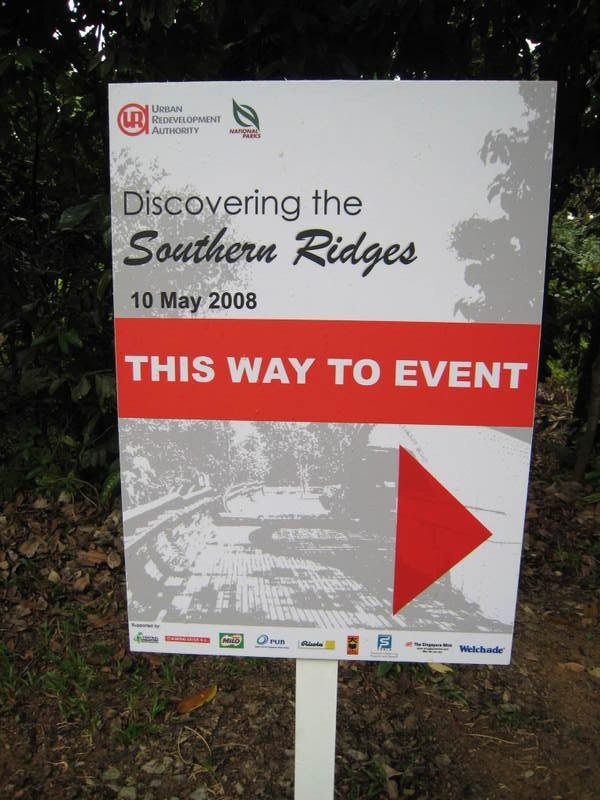
we were too late for the event ( opening ceremony) when we arrived the organizers were already packing up. no goodie bag :( hahah but that's not the main point.

the map of the whole nature trail

this is the view of the bridge from above..rather nice huh! big and solid!

more pictures
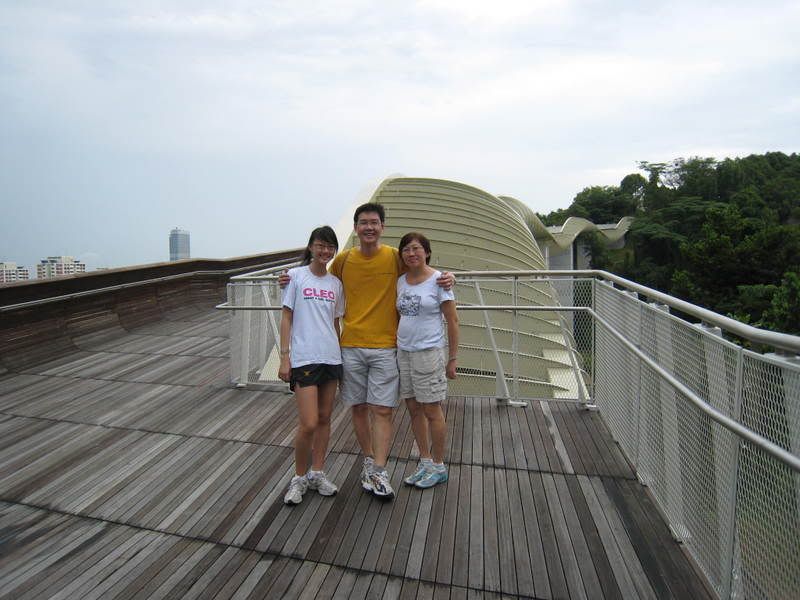
that's us!

i especially like the seats constructed on the bridge as it allows for us to slack there. i would love t slack there at night..nice scenery+ cool wind

second bridge

this metal bridge is super long abt 1.3km and it leads to HortPark ( place with lotsa nice flowers)
allows us to be close to nature..quite cool!
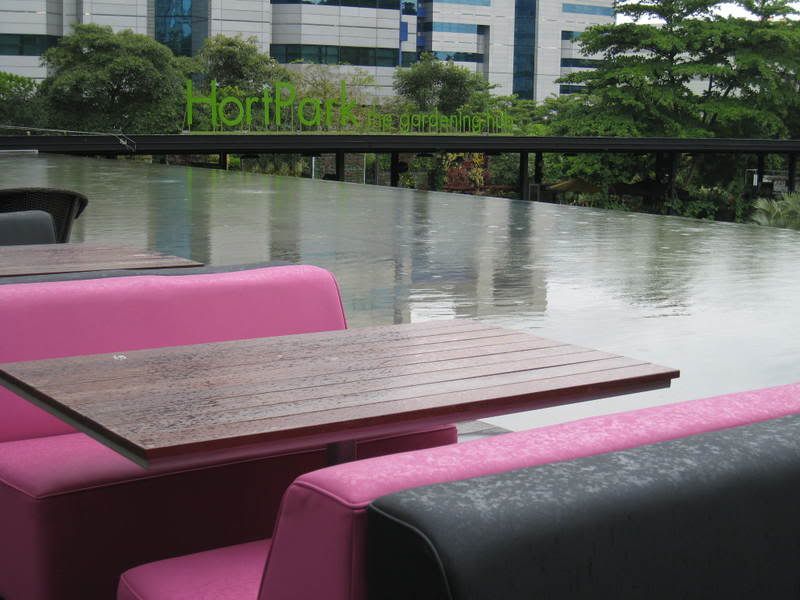



these are some nice pictures i took at the park..=DD
the trail actually leads all the way to Kent ridge park but we stopped at Hortpark and didnt proceed any further ^^
i have no idea what i want to take in university! cos i dont have specific career goals! grrr!!!!
what should i do!?!!
i seriously feel like stopping school for a year and figure out what i exactly want lorrrr.
howhwohwoww.
got into business and communications new media for NUS
communication studies for NTU
business and social sciences for SMU
but right now all dont appeal to me.
thinking of dentistry or smth now..ahhhh. die lah.
im so indecisive.
Was reading up articles online when I came across this article. An article about the attitude of Singaporeans which I find very true! Saddening- but true. I agree with the issues the writer has raised about how kiasu Singaporeans are and how they expect the gov. to do everything for them if not they complain and whine. Such self-centredness.
A cheapskate's take on current issues
By Chua Mui Hoong, Senior Writer
SINGAPOREANS are said to be kiasu and kiasi - afraid to lose and afraid to die, respectively.
A cheapskate's take on current issues
By Chua Mui Hoong, Senior Writer
SINGAPOREANS are said to be kiasu and kiasi - afraid to lose and afraid to die, respectively.
The two KS words sum up the competitive yet risk-averse, self-seeking and scaredy-cat mentality that runs deep in the veins of many an Ugly Singaporean.
There's a third KS trait that is sometimes forgotten: kiam-siap, which is Hokkien for skinflint.
The kiam-siap mentality basically says that one should pay the minimum to extract maximum benefits.
It's a cold, calculating mindset that takes no prisoners.
You can see it in the debate over three ongoing issues: seat belts in school buses, ferrying foreign workers on the backs of lorries, and whether maids should get a mandatory day off a week.
Some Singaporeans find it hard to see the nexus between the cheapskate mentality of wanting to pay the minimum, and declining standards of safety and service.
The issue of seat belts in school buses came to the fore after an eight-year-old boy died after being flung out of his school bus during a collision.
As others have pointed out, there is a strange lacuna in the law which makes belting up in passenger cars mandatory but not in passenger vans and minibuses used to ferry children to school.
One would have thought a simple act of fiat would extend the same level of protection to minors.
But it turns out money is a sticking point.
One is the installation cost - a one-off cost which can be borne by the bus operator, or passed on to customers.
More vexing is that seat belts would reduce seating capacity. Now, it's common to squeeze three kids into double seats meant for two adults. With compulsory belting-up laws, the number of kids per bus may fall, translating into higher bus fares per child.
Bus operators think parents will baulk at higher fares and are reluctant to incur the cost of putting in seat belts.
I think they are right. There will be large numbers of kiam-siap parents who want a door-to-door pick-up and delivery service for their kids to school, but will grumble at every dollar increase in fares. This will be the same parents who complain if their kids get a scratch from being flung about in the bus.
Some Singaporeans find it hard to see the nexus between the cheapskate mentality of wanting to pay the minimum, and declining standards of safety and service.
It's a no-brainer.
Say a school bus has five rows of double seats, which can take 10 adults. Let's say the driver now squeezes in 15 kids to school at $100 a month per child. Having seat belts reduces the capacity to 10 kids. Then the cost per child will have to go up to $150.
Will parents pay that $50 more a month? Few would want to.
But if you put the choice starkly and say it's about paying $50 more for belting up, or risking your child's life every journey - chances are, parents may start to see the benefit of forking out more.
But I won't bet on it. The better chance is that they'll want the Government, or some other body, to pay the cost.
Similarly, when it comes to contractors ferrying workers around on the backs of lorries, the moot issue involves cost. Contractors say it costs more to hire buses to take workers to work sites.
When contracts involve razor- thin margins, contractors and sub-contractors find ways to cut costs - and corners.
The people who bear the brunt of such cost-savings: the worker, especially the least skilled, most powerless worker who is considered almost like a disposable commodity.
It is a sorry statement of our society's values, when safety is compromised and human lives are put at risk, in order that kiam-siap companies can save some dollars by awarding contracts to the lowest bidder.
My view is that the best way to change such practices is to put the pressure on the awarding companies, which are in a position to specify practices which are ethical and safe.
Companies must surely know that ridiculously low bids are not tenable. It's like you're shopping for gold. If someone offers you gold at $1 an ounce, you will know there must be something fishy going on.
Similarly, companies should not suspend their natural state of disbelief in the face of low bids. They should not let their kiam-siap side override their natural decent side.
But it isn't just companies which show this kiam-siap side. Singaporeans do too, when they become employers of domestic maids. They cavil at the idea of giving maids a day off a week.
What about our own need to rest on weekends, they moan. If the maid is off on Sunday, who's going to mind Junior and cook and clean, never mind that the maid is already minding Junior the other six days of the week.
(What's their idea of parenting, anyway? Outsource all care to the maid, and think that giving pocket money and taking Junior out for a burger constitute parenting?)
Of course, giving the maid a day off requires families to make changes to their Sunday routines. The parents may actually have to feed Baby and change Baby's diapers, for example.
But many Singaporeans view their maids as a commodity.
Instead of thinking of themselves as an employer with responsibilities for the domestic maid, their mindset is one of a buyer: having 'purchased' the services of a maid for the minimum amount they can get away with, they want to 'maximise' the services squeezed out of the maid, 24/7, in those two years she is contracted to work in their household.
It stems from the same kiam-siap mentality, of wanting to squeeze the most output from the least possible input.
Far from being an endearing trait, this kind of thinking is a sure recipe for disaster, for it sacrifices safety and standards on the altar of parsimony.
muihoong@sph.com.sg
finished watching 27dresses today..quite a nice show though a rather typical american movie.
finally told my supervisor i wanted to leave next week. they were rather shocked/surprised cause they assumed i wanted to stay till July after i said i wanted to extent! Zz. NO way man!
got a call from NTU, they said i am shortlisted for interview for Nanyang Scholarship! Haha think im one of their last choices cause most ppl already gone for the interview/ received the scholarship already. ( eg. wong zhixin! congrats k!) think its because some ppl reject the scholarship ( like wzx) that's why i have a chance. hahah know this is gonna be my last chance le so i better not screw it up again like my previous dunno how many interviews. shall start chionging newspapers and current affairss!!
went to UNO coffee shop for lunch today with darylg. , weiling, thong ler and yong tai instead of Dover market. shared a plate of fried rice and fish with weiling. took bus there and cabbed back. hahaha all for the western food! oh my we are such pigs!
i am officially going to quit my job next week. ^^
today has been a total waste of time. aimless and spent the whole day munching on snacks ( Craisins, fruits and nuts fusion, meiji choc etc. ) and reading forums ( flowerpod eg. )
wasted one day away again...
working= slack and good pay
BUT
is it worth wasting my PRECIOUS time away like tt?
afterall time is PRICELESS right?
now i realized working is tough! not because its stressful or anything ( at least not for this job) but i realized i am easily bored..it is becoming a torture even working for 4 months! imagine doing the same thing for the rest of your life, going to the same market everyday during lunch ( will get sian of the food de! ) and worst thing is there is no such thing as WORK HOLIDAYS! so even in dec you are sloughing your minds out! the thought of it just sucks!
conclusion: i dont want to join the the working force!
time is ticking by...
oh no..
what happened to my plans of keeping healthy by exercising more, learning new language, doing fun things before school starts, travelling, learning cooking, baking, learning driving etc.
my life is coming to a standstill!
ahh gotta stop procrastinating if not i will not get anything done!
arghh!
Labels: Random
thanks for being my pillar of support and singing companion in my days of boredom at work! =D cant wait to start the new job! whahah.
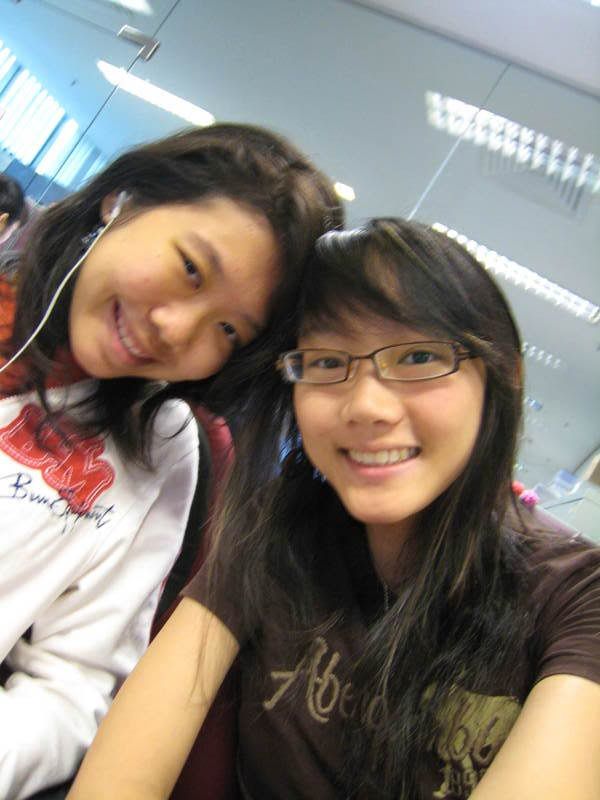
zi-lianing in e office. ^^
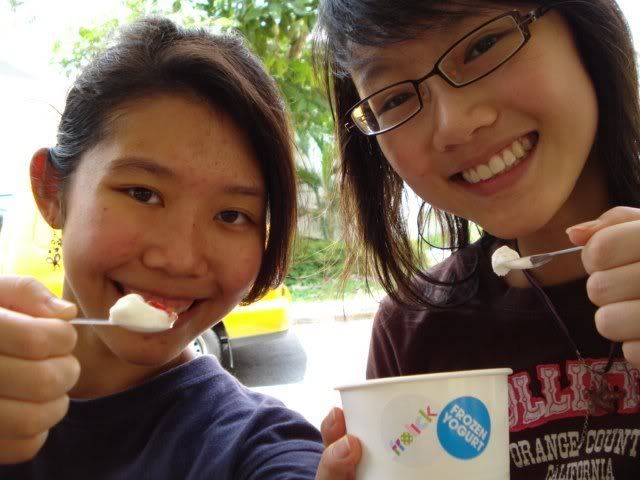
us going to holland v during lunch break to eat yoghurt! yummy! ><
Labels: Personal
Nice and meaningful lyrics! Watch it!
http://youtube.com/watch?v=2RvQ7UgnJUE
I'm in love with you lyrics
Just a gentle whisper
Told me that you’re gone
Leaving only memories
Where did we go wrong?
I couldn’t find the words then
But let me say them now
I’m still in love with you
Tell me that you love me
Tell me that you care
Tell me that you need me
And I’ll be there
I’ll be there waiting…
Chorus
I will always love you
I will always stay true
There’s no one who loves you like I do
Come to me now
I will never leave you
I will stay here with you
Through the good and bad I will stand true
I’m in love with you
Now we are here together
Yesterday has past
Life is just beginning
Close to you at last
And my promise to you
I will always be there
I give my all to you
Living my life without you
Is more than I can bear
Hold me close forever
I’ll be there
I’ll be there for you
Chorus
This I promise
I will never leave you
I will stay here with you
Through the good and bad I will stand through
Hold me closer
Our love is forever
Holding us together
Nothing in this world can stop us now
Love has found..
Love has found a way..
Yea..
I’m in love..
Oh I’m in love
Woo I’m in love
Yes I’m in love
I’m so in love…
With you…
Labels: Random

daryl brought me to the flyer! cos i told him once i wanted to try it.. hehh. and he tried to keep it from me cos he wanted to surprise me. :) we ended up taking a bus from suntec area to the flyer cos he didnt noe it was so near! -.- hahaha!

nice garden =D in the flyer area..
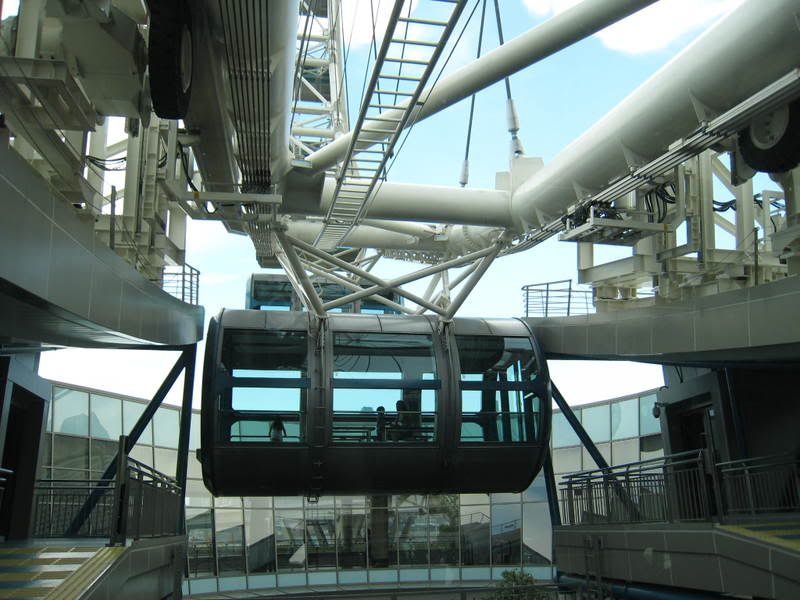
when boarding the flyer we asked the person there whether we can get one whole cabin to ourselves to which her reply was ' can..but you have to prebook and it would be at a fee of $1000!' crazy right! so ex! so we said its ok and hurried off.
then reached the cabin boarding area. there was no queue and we realized that it was possible to get one whole cabin to ourselves!

excited us!
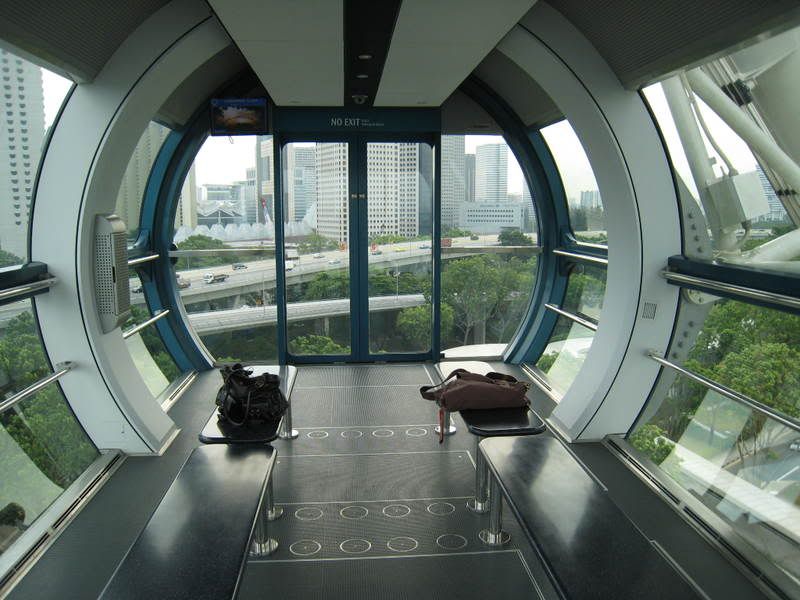
empty cabin..=DD
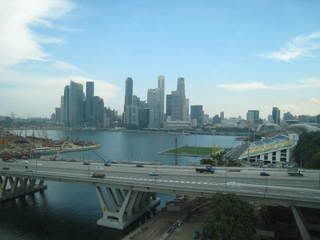
nice scenery right! haha too bad the construction quite unsightly. and we can see tt singapore is really small and every part is connected. we saw arab street, concourse, suntec, golden mile, clarke quay, city hall, raffles place, kallang...everything is so near each other!
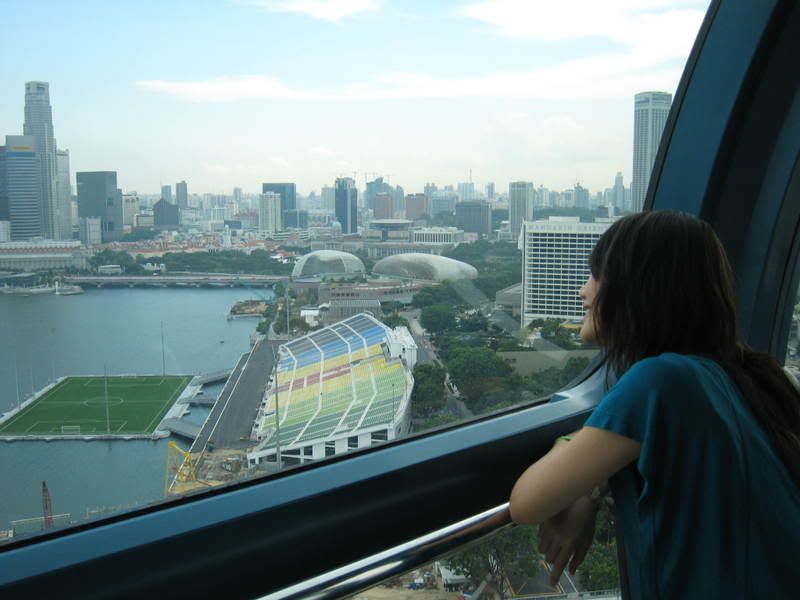
happy me :))
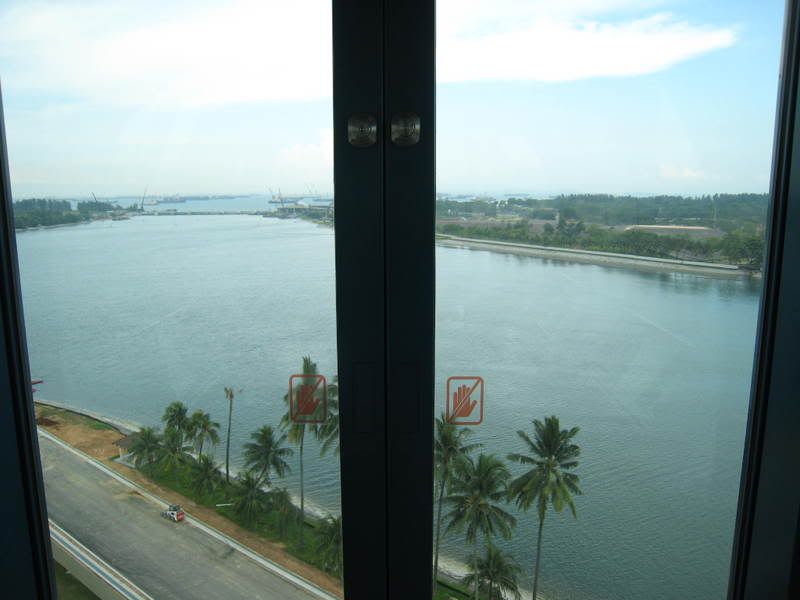
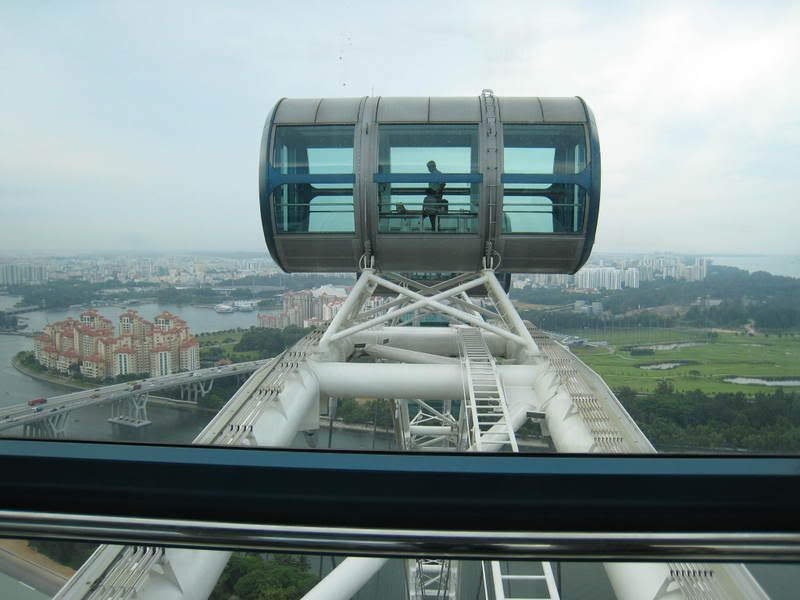
at the peak!

it was kinda fun! haha but it is very ex. so i think i would only sit it once for the experience :)
after that we went to indulgez to eat. had lobster bisque and portobello mushroom burger and this hawaiian fish thingy. there was a side note under the hawaiin fish which says not suitable for pregnant woman and ppl with weak digestive system. weird huh. or so i thought ( more on it later)

lobster bisque ( quite nice...flavourful)

my portobello mushroom burger ( not bad but filling!)

daryl's fish dish
ahhaa after the meal, i suddenly felt like vomitting! and stomach felt unwell all the way. think its due to the fish! cos i ate quite a lot of it! wahh..dunno why also. got this lingering taste in my mouth..
hahaa and we went to sentosa at night =D
thanks daryl for the lovely day!
felt quite bad cos this is the first bdae i did not spend with my family. haiii and sis called me saying she wanted to spend the last 30 mins of my bdae with me. aww so sweet!
my big list of thank yous!
ahma&mama&papa for nice dinner & angpow :*
sis&bro for big card and random treasure hunt goodies =O
daryl: personalised calender&spore flyer trip& meal >< weiling: homemade pendant ^^ kelvinhow: precious thots plaque :D marvin: FR chocolates =D thongler: DARS choc :) hongkun and daryl g. : perlini silver necklance+pendant :)) terry: meiji choc and cute soft toy!
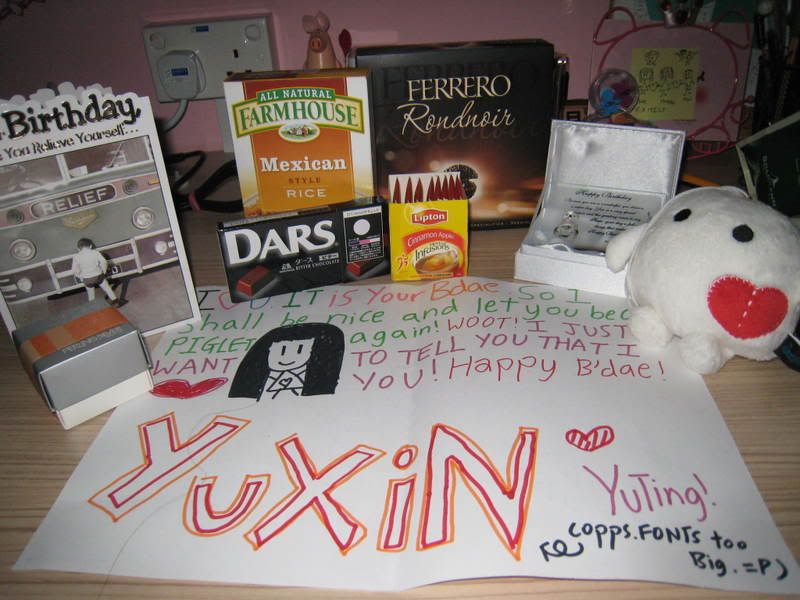
i would also like to thank
euniceleck,seantan, shuangying, kelvin, serene,marvin,hongkun, zihui, jeslin, yiwei, kityeng, daryl g, weiling, liru, qilu, hsin yinn, terry, janice, lekchia, yizhen, valerie, aline,chris seah, eunice tan, tienaik, cheeshan, callista, xueming, yuherng, donald, weiquan, sheaufong, daryl, yingchern, xavier, edwin, chankeet, wanling
for your sweet msgs! =D

shall blog more about my bdae soon =D aft i upload the pics!
Labels: Personal
Mindset of an Extrovert- the more the merrier ( people)
Mindset of an Introvert- the less the merrier ( people)
A woman's height is inversely proportionate to the height of her heels.
Labels: Random




